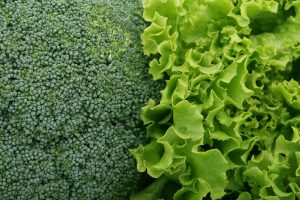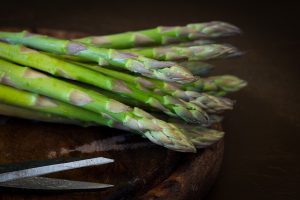Ok, the holidays have been over for weeks and weeks now, so it’s getting harder to blame that uncomfortably swollen belly on a cookie-induced food baby. Don’t worry, though, that distended belly is most likely caused by simple bloating (and don’t feel bad about it – nobody has a completely flat belly ALL the time, no matter what Instagram says). Bloating is very common: at least 16 – 30% of people say they experience it regularly.
Not to be confused with water retention, bloat is the result of having extra gas in your system due to swallowing air or eating certain foods, so the culprit is most likely something in your diet. If that’s the case, it’s an easy enough fix: the first step is to know which foods are likely to cause bloating, and which ones might help you relieve it.
Other Causes of Bloating

Before we look at the most likely causes of bloating, we should mention that there are other possible reasons behind your uncomfortable belly. If you feel very bloated every single time that you eat, you may want to speak to your doctor about it. According to Rachel Doyle, RDN, “It could be a sign that something is out of whack with your gut health and digestion.” More serious causes behind excessive bloating include:
- Celiac disease
- Constipation
- Irritable bowel syndrome (IBS)
- Inflammatory bowel disease
- Gastroparesis
- Cancer
In most cases, though, dealing with a bit of bloat is a matter of some dietary tweaks. Now, it can be tough to know exactly what is triggering your belly bloat, so there may be a little bit of trial and error involved. “A food that causes bloating for your friend might not do the same for you and vice versa,” as Rachel Doyle points out. “That being said, there are some common culprits.”
Foods That Bring the Bloat
- Legumes – Yes, we all know the rhymes dedicated to beans, the magical fruit. There’s a reason these classy poems exist: most legumes, which includes beans and lentils, contain sugars called alpha-galactosides and fiber, both of which can cause bloating. Alpha-galactosides belong to a group of carbs knowns as FODMAPs (fermentable oligo-, di-, mono-saccharides and polyols). FODMAPs are short-chain carbohydrates that escape digestion and are then fermented by gut bacteria in the colon. Gas is a byproduct of this process. Some people tolerate this fermentation better than others; some, unfortunately, experience uncomfortable bloating, so if you’re one of them, experiment with taking some of these foods out of your diet one at a time.
One thing to consider is that legumes are chock full of protein and nutrients (fiber being a necessary one, despite its tendency to cause tummy trouble), so try not to cut them out of your diet completely. If they’re really causing you trouble, try lighter colored lentils, black beans, or pinto beans (all of which may be easier on your digestive system) and soak them if possible. If you’re looking to add more protein into your diet without the beans, try quinoa. 
- Cruciferous veggies – This is not an excuse to feed your greens to the dog, but cruciferous vegetables like broccoli, cauliflower, brussels sprouts, kale, arugula, and cabbage contain a sugar called raffinose, which can cause gas, according to the International Foundation for Gastrointestinal Disorders. On the other hand, these veggies are extremely good for you, so instead of cutting them out altogether, try eating smaller portions, eliminating one at a time to see which bothers you, or cooking them to get rid of some of the raffinose. And if you really need a break from these nutritional powerhouses, supplement your diet with other nutritious veggies like spinach, sweet potatoes, and zucchini.
- Apples – An apple a day keeps the doctor away, for more reasons than one, apparently. While apples are undeniably healthy, they also contain fructose and fiber, which can ferment in the large intestine and cause gas and bloating. Apples are also considered a high FODMAP food. Try cooking them (mmm…applesauce!), or switching to other fruits like strawberries, bananas, or blueberries.
- Processed/packaged foods – Bet you can’t eat just one potato chip, right? The reason? Sodium (ok, and the crunch)! Processed foods tend to be so hard to put down because they’re salty; they also cause bloating for the same reason. While sodium technically is causing water retention because it holds onto water, the results are the same: swelling and bloating. Try to limit high-sodium processed foods – it’s better for your health to do so, anyway!
- Fatty foods – Some fats are good for you; others, less so. Foods high in saturated fat are not great for you and should be limited; they can also cause bloating because they take longer to digest than other foods. According to Kristin Gillespie, RD, a certified nutrition support clinician, “Because these move more slowly through the GI tract, this can result in bloating.” Try to limit your saturated fat intake to less than 10% of your daily calories.
-

Wheat can cause bloating, especially if you have celiac disease. Dairy – Think lactose intolerance isn’t a thing? Think again: around 75% of the world’s population can’t break down lactose, the sugar in dairy products like milk, butter, cheese, and ice cream (the horror!). This struggle to break down lactose can cause – you guessed it – gas and bloating. The one exception might be yogurt (more on that below). Fortunately, nowadays there are a lot of alternatives to straight-up dairy products, like lactose-free products and dairy alternatives made with soy or nuts.
- Wheat – Here’s a controversial one, but it is true that wheat is a major source of FODMAPs, and gluten, the protein found in wheat, can also cause digestive discomfort in people with a gluten sensitivity (or, more seriously, celiac disease). As with dairy, there are tons of gluten-free alternatives to wheat like oats, quinoa, buckwheat, and almond and coconut flours.
Foods That May Help Beat the Bloat
- Yogurt – Most dairy can be a real belly buster, but yogurt is the exception. According to Gillespie, “Containing probiotics, which help to regulate digestion and improve overall GI health, yogurt can help prevent bloating.” Just make sure to look for products that tout “live, active cultures,” and avoid sugary varieties, as too much sugar can contribute to bloating (and all that sugar kind of cancels out the health benefits of that lovely yogurt!)
- Cucumbers – While you’re slicing up cukes for your under-eye puffiness, slice up a few for your puffy belly, too! Cucumbers contain quercetin, a flavonoid antioxidant that helps reduce swelling. According to Cynthia Sass, RD, MPH, “Cucumbers have been shown to inhibit the activity of pro-inflammatory enzymes.”

- Asparagus – Ok, yeah, it makes your pee smell, but it also just makes you pee, period. The aspargine in it is a diuretic, which helps you flush out salt and water and relieve discomfort and bloating. Asparagus also contains prebiotics, which help support the growth of ‘good’ bacteria, as well as soluble and insoluble fibers, which helps promote overall digestive health.
- Bananas – Foods high in potassium, including bananas, kiwis, pistachios, and avocados, prevent water retention by regulating sodium levels in your body, meaning they can reduce salt-induced bloating. Bananas also have soluble fiber, which can relieve or prevent constipation, which could also be behind your bloated belly.

Peppermint tea can help get rid of the gas that causes stomach bloat.
- Papaya – The enzyme in papaya, papain, helps break down proteins in your GI system, which makes digestion easier. Like cucumbers, it is thought that papaya has anti-inflammatory properties. They also have fibers that support a strong digestive tract. Try freezing it and blending it into a delicious smoothie!
- Peppermint tea – After a big meal, or when you’re feeling bloated, sit back with a nice, hot cup of peppermint tea, which can relax GI muscles. This helps dissipate the gas that causes your stomach to bloat.
If you’re experiencing the bloat, you’re definitely not alone! But there are strategies to help keep it at bay. Experiment with removing the above foods, but remember, there’s no need to cut them all out for good – figure out which are causing you trouble, and go from there! And if you’re experiencing persistent digestive problems, talk to your doctor about trying a low FODMAP diet, or about other possible causes to your discomfort. You can beat the bloat!